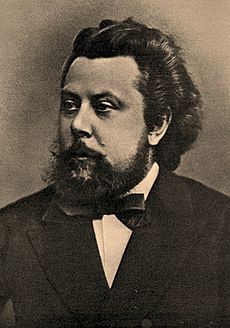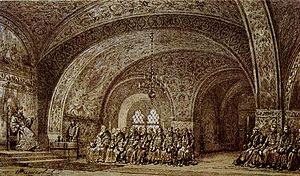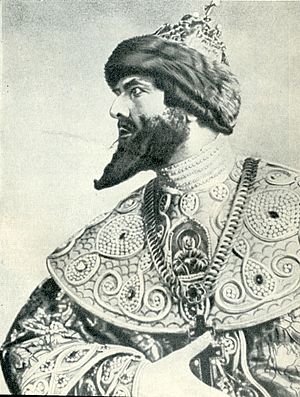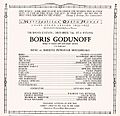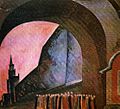Boris Godunov (opera) facts for kids
Boris Godunov (Russian: Борис Годунов) is an opera by Modest Mussorgsky (1839–1881). It was the only opera that Mussorgsky finished. It is his most famous work and one of the most famous of all Russian operas. It was composed between 1868 and 1873.
Contents
What the opera is about
The story of the opera is based on something that really happened in Russian history. The Russian people were ruled by a tsar (an emperor). The previous tsar Tsar Ivan IV was known as “Ivan the Terrible”. He was terribly cruel and the Russian people suffered badly under his rule. They were hungry, many of them were repressed and killed. When he died his son became Tsar, but he was mentally ill and incapable of ruling the country, so a group of powerful people including Boris Godunov had to rule for him. Ivan also had another son, but he disappeared. He was almost certainly murdered, and Boris Godunov, who wanted to become tsar himself, had probably ordered him to be murdered (for the sake of the opera, Mussorgsky assumes that he was indeed guilty of his murder). Then he persuaded the Russian people that they should choose him to be their tsar.
Some years later a young monk escapes from his monastery and pretends to be the murdered son of Ivan the Terrible. He gets a Polish army to help him to fight Boris Godunov. Boris Godunov feels terribly guilty about the murder. He suffers so much that he dies. The young monk arrives in Moscow and makes himself tsar (Tsar Dimitri II). The ordinary Russian people remain desperately poor. It is their fate to suffer, ruled by cruel tyrants.
How the opera was composed
The composer wrote the words (the libretto) himself. It was based on a play by Aleksandr Pushkin. Mussorgsky also read a famous book on the history of Russia: Nikolay Karamzin's History of the Russian State and used some of the historical material from this book.
Originally Mussorgsky composed the opera in 1869, but in those days it had to be approved by the censors before it was allowed to be performed. The opera was rejected by the censors. The main reason they gave was that there were no female characters in the opera. Mussorgsky made lots of changes, including adding a whole new act with Dimitry in love with a Polish princess. Another reason why the opera had been rejected was that composers and dramatists were not allowed to have the character of a tsar on stage. However, Tsar who then ruled said he did not mind, so the opera was first performed in 1874 in Saint Petersburg.
The opera Boris Godunov can either be performed in the first version of 1869, or in the second version of 1874. In actual fact performances of the opera have often been something of a mixture, as opera directors have often made cuts, or changes to the music or the order of scenes. The composers Nikolai Rimsky-Korsakov and Dmitri Shostakovich have both made new editions of the opera in which they thought they could improve some of Mussorgsky’s harmony or orchestration. For many years it was these editions that were usually performed. Nowadays people realize more and more that Mussorgsky’s harmonies and orchestrations, which were very original for their time, were quite deliberate and very effective. Modern performances therefore often go back to what Mussorgsky originally wrote.
By the close of 1868, Mussorgsky had already started two operas, but never finished them These were Salammbô and Marriage, which was influenced by Alexander Dargomyzhsky's opera The Stone Guest. Mussorgsky was breaking away from the Romantic style that many composers used at the time. He had learned a lot by trying to write these operas and he used some of the musical ideas in Boris Godunov.
Vladimir Nikolsky, a professor of Russian history, suggested to Mussorgsky the idea of writing an opera about Boris Godunov, based on Pushkin’s play. Mussorgsky worked very fast on the opera, finishing the vocal score (i.e. without the orchestration) in 9 months. During this time he was also working as a civil servant. When he state censor rejected the opera he worked another two years on it, adding a female role as required, and making other changes he felt necessary: adding three scenes, cutting one and changing another, adding songs for the Hostess, Fyodor and the Nurse. In 1873 three scenes were performed, and on 27 January 1874 the first performance of the whole opera took place. The conductor, Nápravník, was a good conductor, but he often made cuts in the operas he performed. He cut the whole of the Cell Scene because he thought the opera was too long. Nevertheless, it was a great success among many people, although some critics hated it. It was performed 21 times in Mussorgsky’s lifetime.
Famous interpreters of the main role
During the early 20th century the Russian bass singer Fyodor Shalyapin was a very singer who often sang the role of Boris.
Roles
| Role | Voice type | Premiere cast Mariinsky Theatre, St Petersburg 27 January 1874 Conductor: Eduard Nápravník |
|---|---|---|
| Boris Godunov | bass or baritone | Ivan Melnikov |
| Fyodor (or Feodor), his son | mezzo-soprano | Aleksandra Krutikova |
| Xenia Borisovna Godunova (or Xenia), Boris' daughter | soprano | Wilhelmina Raab |
| Kseniya's nurse | contralto | Olga Shryoder (Schröder) |
| Prince Vasiliy Ivanovich Shuysky | tenor | Vasiliy Vasilyev, "Vasilyev II" |
| Andrey Shchelkalov, Clerk of the Duma | baritone | Vladimir Sobolev |
| Pimen, chronicler-hermit | bass | Vladimir Vasilyev, "Vasilyev I" |
| The Pretender under the name Grigoriy (in training with Pimen) | tenor | Fyodor Komissarzhevsky |
| mezzo-soprano | Yuliya Platonova | |
| Rangoni, a covert Jesuit|bass | Josef Paleček | |
| Varlaam, a vagabond | bass | Osip Petrov |
| Misail, a vagabond | tenor | Pavel Dyuzhikov |
| The Innkeeper | mezzo-soprano | Antonina Abarinova |
| The yuródivïy | tenor | Pavel Bulakhov |
| Nikitich, a police officer | bass | Mikhail Sariotti |
| Mityukha, a peasant | bass | Lyadov |
| The Boyar-in-Attendance | tenor | Sobolev |
| The Boyar Khrushchov|tenor | Matveyev | |
| bass | Vladimir Vasilyev, "Vasilyev I" | |
| bass | Sobolev | |
| Chorus, silent roles: Boyars, the Boyars' children, streltsï, bodyguards, policemen, Polish nobles, Sandomierz maidens, wandering minstrels, people of Moscow | ||
Discography
- 1948: Mark Reizen (Boris), Georgi Nelepp (Grigory), Maria Maksakova (Marina), Maxim Mikhailov (Pimen); Bolshoi Theatre Chorus and Orchestra, Nikolay Golovanov - (Arkadia)
- 1949: Aleksandr Stepanovich Pirogov (Boris), Georgi Nelepp (Grigory), Maria Maksakova (Marina), Maxim Mikhailov (Pimen); Bolshoi Theatre Chorus and Orchestra, Nikolay Golovanov - (Opera d'Oro)
- 1952: Boris Christoff (Boris, Pimen), Nicolai Gedda (Grigory), Eugenia Zareska (Marina); Chœurs Russes de Paris, Orchestre National de la Radiodiffusion Française, Issay Dobrowen - (EMI Classics)
- 1954: Miroslav Changalovich (Boris), Miro Branjnik (Grigory), Melanie Bugarinovic (Marina), Branko Pivnichki (Pimen); Belgrade National Opera Chorus and Orchestra, Kresimir Baranovich - (Decca)
- 1962: Boris Christoff (Boris, Pimen), Dimiter Uzunov (Grigory), Evelyn Lear (Marina); Chorus of the Sofia National Opera, Orchestre de la Société des Concerts du Conservatoire, André Cluytens - (EMI Classics)
- 1962: Ivan Petrov (Boris), Vladimir Ivanovsky (Grigory), Irina Arkhipova (Marina), Mark Reshetin (Pimen); Bolshoi Theatre Chorus and Orchestra, Alexander Melik-Pasheyev - (Melodiya)
- 1963: George London (Boris), Vladimir Ivanovsky (Grigory), Irina Arkhipova (Marina), Mark Reshetin (Pimen); Bolshoi Theatre Chorus and Orchestra, Alexander Melik-Pasheyev - (Sony)
- 1970: Nicolai Ghiaurov (Boris), Ludovic Spiess (Grigory), Galina Vishnevskaya (Marina), Martti Talvela (Pimen); Wiener Sängerknaben, Sofia Radio Chorus, Wiener Staatsopernchor, Wiener Philharmoniker, Herbert von Karajan - (Decca)
Related pages
Images for kids
-
Eduard Nápravník conducted the premiere of Boris Godunov (1874). The Czech Nápravník would spend more than 40 years in the service of Russian music as chief conductor of the Imperial Mariinsky Theatre. In Rimsky-Korsakov's memoirs, Chronicle of My Musical Life, the composer praises his keen ear, his ability to detect errors, and his overall technique, but faults him for his rapid tempi, his interpretational inflexibility and insensitivity, and, most of all, for his habit of making sweeping cuts.
-
Ivan Bilibin's design for the Cell Scene (1900s)
-
From Mussorgsky's letter of 13 July 1872 to Vladimir Stasov: A citation from the closing bars of the opera (1872 version). The upper part depicts desolation; the lower, weeping. The inscription is a line from the yuródivïy's lament:
«Скоро врагъ придётъ и настанетъ тьма» "Soon the enemy will arrive and darkness will come" -
The Mariinsky Theatre opened in 1860. Boris Godunov received its premiere there in 1874.
-
Nikolay Rimsky-Korsakov edited Mussorgsky's works (often drastically) to enable them to enter the repertoire. Portrait by Valentin Serov (1898).
-
Fyodor Shalyapin was a powerful exponent of the Rimsky-Korsakov version, which launched Boris Godunov abroad. Portrait by Aleksandr Golovin (1912).
See also
 In Spanish: Borís Godunov (ópera) para niños
In Spanish: Borís Godunov (ópera) para niños


